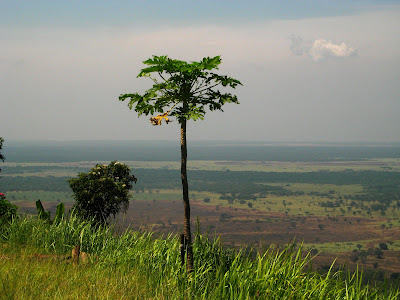That's Luganda for "I'm baaaack..." I've been in Uganda for the last two years serving in the Peace Corps and this website has been on hiatus. Before I left in February of 2007 this blog got a lot of attention after I posted a video of my friend's waterboarding me. This didn't sit well well with the PC administration in Washington and I was deemed a safety and security risk. We reached an agreement that I would be allowed to serve in Uganda on the condition that I wouldn't post to this blog.
However, these last few years have been fruitful and creative. While I lived in primitive conditions in a village in Southern Uganda without electricity, I kept a thorough online account of each day's adventures using my mobile phone. My work was also recognized by the Peace Corps and the American government on numerous occasions.
I can't say that I wasn't dreaming of this moment when I was out in the bush. I'd been sitting on an ever-growing number of cache of videos. Now I've finally got access to first-world broadband that's fast enough to upload them. I'm hoping that the collection of African media will bring better exposure to the marginalized populations that collaborated with me to make them.
Awareness and advocacy are some of the ideas behind this blog. Media literacy and empowerment are equally relevant. Now that I'm back, I'd like to tackle some of the big themes of "media for social change" by creating applications and platforms for greater community interaction at a global level. Some of them, for example, are leapfrog technology, viral marketing, and social networking. Rather than follow the conventional trend of making these functions push OS land speed records for high bandwidth, I want to go lo-fi. I want to target a population that wouldn't normally have the means to access the Internet. I'm interested in emerging communications technology at the rural level.














2 comments:
Apwoyo dugu.
That's Acholi for "welcome back." I'm looking forward to seeing all of your thoughts and seeing your works. People the world over can now, in theory, access almost all knowledge with little more than an internet connection. We've already seen in Google's debacle in China that authoritarian regimes are scared of the democratizing power of the internet, but the technology can't be held back forever, and we've already seen, in our time in Uganda, just how empowering cell phones and even slow internet connections are. It's more possible than ever for like-minded people the world over to find each other and band together. We can only hope it leads to greater awareness and positive movements for social good. The cynic in me could tell you my reservations, but the idealist looks forward to you expounding on and exploring the possible in this very space.
Webale emirimu, ssebo.
Thanks, I agree Oyat. The technology was meant for the masses to interact with one another even if they're worlds apart. My interest is in how you can get the most out of those communications. How do you make information accessible to the guy who just got his first cell phone and waits in line for slow Internet at a cybercafe?
If the World Wide Web is truly universal then it can't solely be preoccupied with the First World. It must accommodate the needs of the Third World as well.
I welcome cynics and devil's advocates. Entertaining them is the only way to implement idealism.
Post a Comment